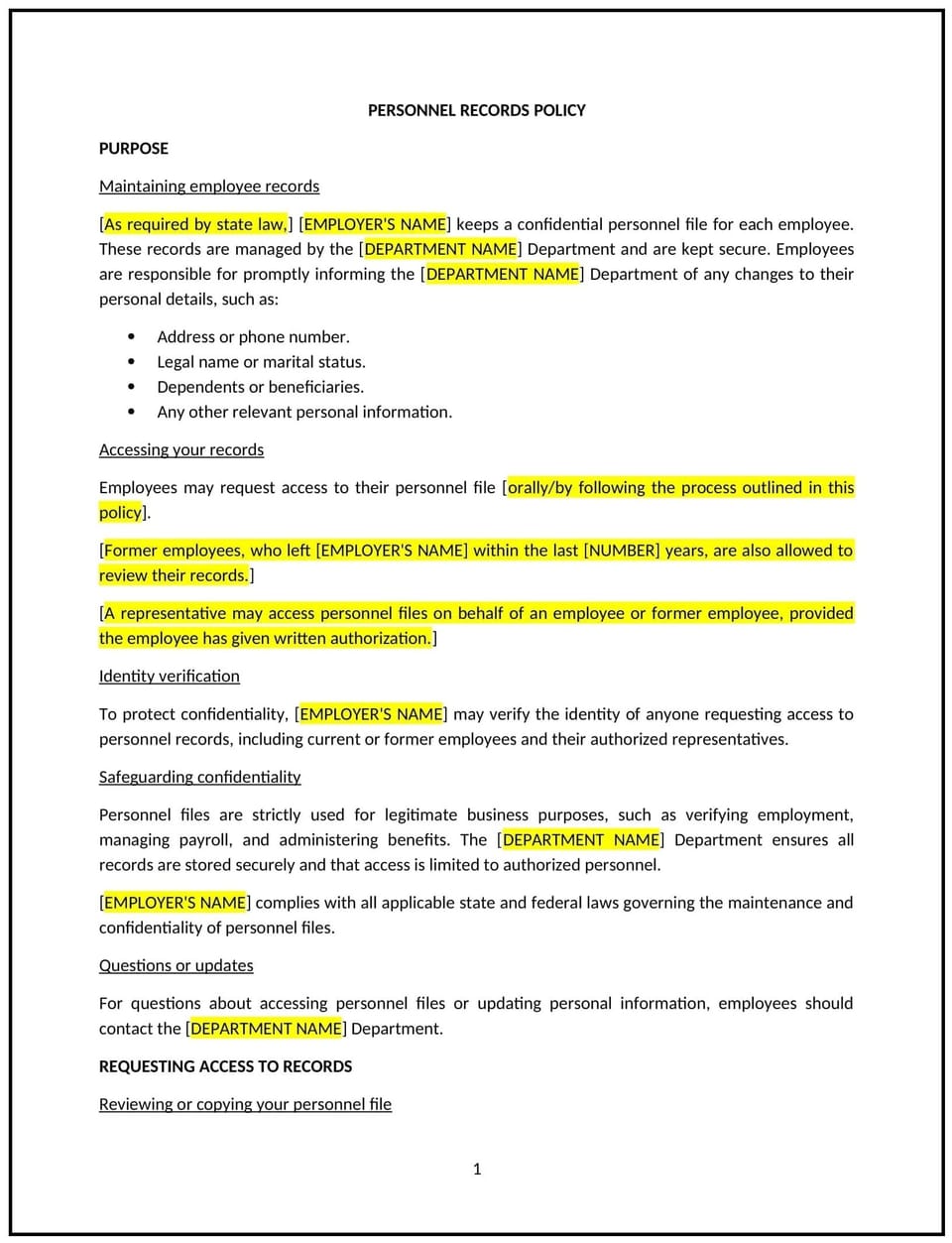Personnel records policy (Louisiana): Free template

Personnel records policy (Louisiana)
This personnel records policy is designed to help Louisiana businesses manage employee records effectively while maintaining confidentiality and ensuring proper access and retention procedures. It outlines the types of records maintained, responsibilities for recordkeeping, and processes for employee access.
By implementing this policy, businesses can safeguard sensitive information, promote transparency, and streamline record management.
How to use this personnel records policy (Louisiana)
- Define scope: Specify the types of personnel records maintained, such as employment history, performance reviews, and payroll information.
- Outline access guidelines: Detail who can access personnel records, including employees, HR, and management, and under what circumstances.
- Include retention periods: Specify how long personnel records will be kept and when they will be securely disposed of.
- Address confidentiality: Emphasize measures to protect the privacy and security of personnel records, such as restricted access and secure storage.
- Provide access procedures: Outline how employees can request access to their records and the timeframe for fulfilling such requests.
- Detail update processes: Explain procedures for employees to update personal information, such as contact details or emergency contacts.
Benefits of using a personnel records policy (Louisiana)
Implementing this policy provides several advantages for Louisiana businesses:
- Promotes transparency: Ensures employees understand their rights regarding access to their records.
- Protects privacy: Safeguards sensitive employee information through clear confidentiality guidelines.
- Streamlines management: Establishes consistent procedures for maintaining and accessing records.
- Reduces risks: Minimizes potential disputes by maintaining accurate and up-to-date records.
- Reflects Louisiana-specific considerations: Adapts to regional workplace practices and legal expectations.
Tips for using this personnel records policy (Louisiana)
- Train HR staff: Ensure HR personnel are knowledgeable about recordkeeping practices and confidentiality requirements.
- Use secure storage: Store records in secure, access-controlled locations, whether physical or digital.
- Conduct audits: Regularly review personnel records for accuracy and compliance with retention schedules.
- Communicate clearly: Inform employees of their rights and responsibilities regarding personnel records during onboarding.
- Update regularly: Revise the policy to reflect changes in workplace practices or Louisiana-specific considerations.
Q: What types of records are included under this policy?
A: Personnel records may include employment applications, performance evaluations, payroll information, disciplinary actions, and other employment-related documents.
Q: Who has access to personnel records?
A: Access is typically limited to HR personnel, management, and the individual employee, depending on the purpose and context.
Q: How can employees request access to their personnel records?
A: Employees should submit a written request to HR, who will provide access within a reasonable timeframe as outlined in the policy.
Q: How are personnel records stored securely?
A: Records are stored in locked cabinets for physical files or on access-controlled, encrypted systems for digital records.
Q: What is the retention period for personnel records?
A: Retention periods vary depending on the type of record but are typically outlined in the policy to align with business needs and applicable regulations.
Q: How can employees update their personal information in personnel records?
A: Employees can notify HR and provide necessary documentation to update information like addresses, phone numbers, or emergency contacts.
Q: How often should this policy be reviewed?
A: The policy should be reviewed annually or whenever changes in workplace practices or Louisiana-specific requirements arise.
This article contains general legal information and does not contain legal advice. Cobrief is not a law firm or a substitute for an attorney or law firm. The law is complex and changes often. For legal advice, please ask a lawyer.


